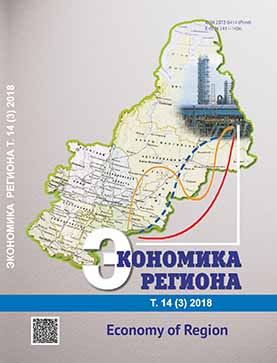Расхождение взглядов К. Маркса и А. И. Герцена на перспективы экономического развития России. Значение для современности
Differences of Opinion between K. Marx and A. I. Herzen over the Prospects of Economic Development of Russia: Significance for the Present Time
Author(s): Vladimir Stepanovich BochkoSubject(s): Economy
Published by: Институт экономики Уральского отделения Российской академии наук
Keywords: K. Marx;A. I. Herzen;Russian capitalism;rural community;social imprinting;national mentality;specificity of economic system
Summary/Abstract: The article analyses the differences in views between K. Marx and A.I. Herzen on the prospects of economic development of Russia in the second half of the 19th century. The paper shows that K. Marx proved his views relying on the development of the industry, which had created conditions for the extension of the individualistic capitalist relations as well as for the appearance of the proletariat. A. I. Herzen paid more attention to the community relations, which gave to the Russian capitalism national specificity. A considerable part of the differences between the views of K. Marx and A. I. Herzen on the prospects of economic development of Russia is connected with their attitude towards the Russian rural community. Therefore, the article reveals their understanding of this phenomenon. K. Marx understood the community in connection with land ownership. However, A. I. Herzen attributed different social aspects to the community, as well as discussed communal self-government. For the first time, I define their mental perception of the opportunities of social transformations in Russia as one of the main differences in views between K. Marx and A.I. Herzen. K. Marx was shaped by the values of industrial and urban society. Therefore, he looked at the prospects of economic development of Russia through the materialistic understanding of history, and considered the proletariat as the driving force of transformations. A. I. Herzen’s way of thinking developed under the influence of the Russian mentality. As an artist and writer, he adhered to a figurative and intuitive, emotional type of thinking, which is closer to the rural life. He supported the change of a social regime, but considered that one should not destroy all the previous orders simply because they were old. He thought that it was necessary to understand the features of national mentality, and that the Russian collectivism was suitable for socialism more than the Western European individualism. I have proved that the differences of opinion between these two scientists are directly relevant to a challenge of choosing the road for the development of Russia in the 21st century. The collectivistic origins are to be considered, as well as the ideas of a social imprinting when forming the modern Russian capitalism. I have concluded that there were no serious differences in opinion between K. Marx and A. I. Herzen on the prospects of economic development of Russia in 19th century. There were certain divergences in views on understanding the Russian society. These divergences allow to see the beginning of essentially new approaches to the socio-economic development of modern Russia.
Journal: Экономика региона
- Issue Year: 14/2018
- Issue No: 3
- Page Range: 740-757
- Page Count: 18
- Language: Russian

